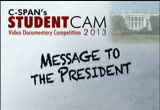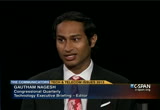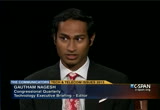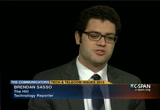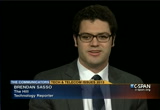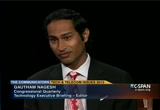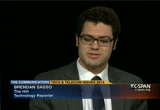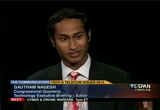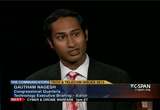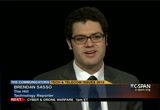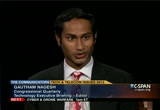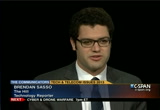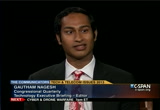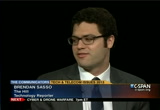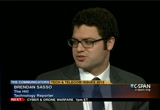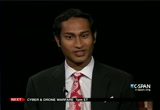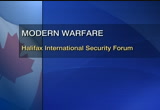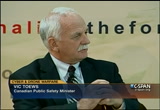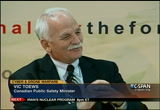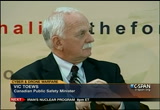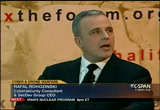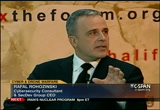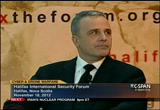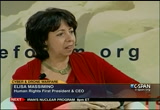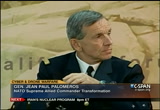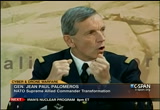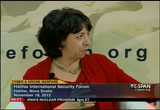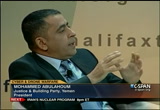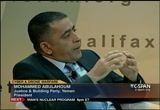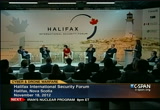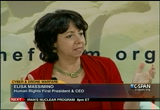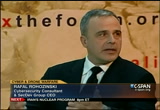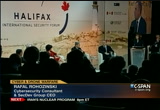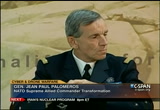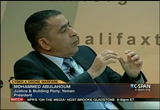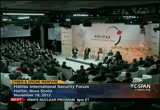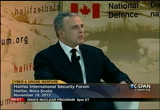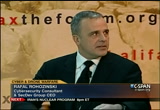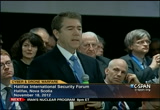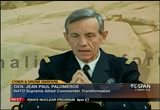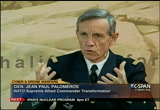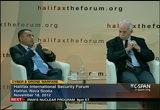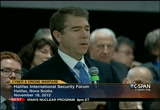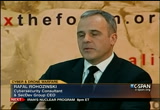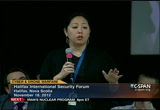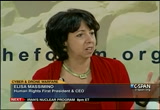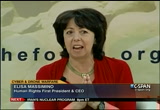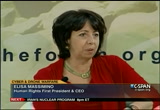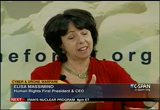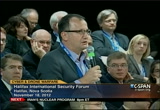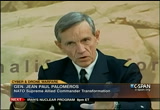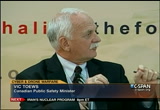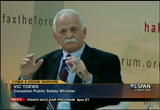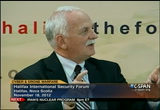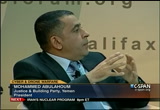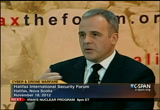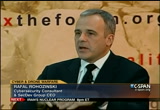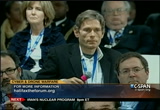tv The Communicators CSPAN January 5, 2013 6:30pm-8:00pm EST
6:30 pm
cam video entries with your message to the president right lane due. get to c-span by the deadline. there is $50,000 in total prices. go to studentcam .org. >> well,, with the 113th congress convening this month we thought we would take this opportunity and look at their agenda and the policy agenda of the federal communications commission. joining us is three reports of congressional quarterly. what is an issue that you see in the next congress? >> i think cyber security remains top priority. we saw that congress failed to reach an agreement on cyber security in 2012 as perhaps many predicted. they remain very far a part.
6:31 pm
that being said, the administration is threatened to implement a lot of their legislation to by executive order which gives them negotiating leverage and we have reports that president obama issued a secret address some of the collaboration between the administration and the private sector. regardless we will see more action on cyber security in the first half. legislation seems to be a difficult proposition. go back to that secret directive, will that become public or reviewed by congress? >> it is difficult to say. it is not something that is reported quite a bit. but it addresses one of the most controversial aspects of the cyber security regime. whether that is legal under current law because there is rules against sharing information with the government.
6:32 pm
so, again, there is little known about that but we do know that the government is insist ant that there needs to be some kind of rules to change to enable some of rules that are in place to do so under the law. >> bendan sasso is with the hill encovers technology with the publication. >> let's say neutrality. the d.c. circuit is considering the challenge to the f.c.c.'s rules. it is unclear how the court is going to rule but there are implications that the d.c. circuit is september cal of the f.c.c.'s authority. if they strike down rules then they could enact a law but i don't see the republicans going for it. then we're back to square one.
6:33 pm
>> do you see that coming to congress at some point or do you see the court making a decision? >> the court is going to make a decision and that could come early this year. if they uphold the rules then that is going to be safe and that is going to be the standard now. if they strike them down, it will be whether congress will try to act to give the f.c.c. authority in this area. as long as the republicans control the house i don't see it happening. if they do strike down the rules that is broader because it puts the f.c.c.'s power to regulates the internet into question. that is the core of the issue here. not just the neutrality buddha that caps or on other issues, does the f.c.c. have the power to regulate the communication service or are they going to be sort of an outdated agency like they are regulating telegraphs
6:34 pm
and everyone else moved on. >> eliza krigman is from politico. >> i will agree with bendan. if you look at the big picture can which has to do with regulating the internet which is the most important platform in communications right now. i think the conventional wisdom is that the court is likely to strike it down. even the supporters are uncomfortable with the fact that the commission did not use what is known as title two authority under the communications act to craft those regulations. they went with something under title one, they thought it was weak under the law. they are very nervous about it. nobody has a crystal ball and knows what will happen so i think it is likely that question will go back to congress and
6:35 pm
that is unlikely that republicans will go for it. but will democrats make a big push? another issue to consider will google provide the same rule as corporate rabbi if you will. if you recall several years ago they came up with a deal with verzon. a lot has changes for that company since that time and now, they have a more diverse portfolio. i think it will interesting to see who comes to the stage to make a play for that neutrality if the court strikes down the rule. >> speaking of issues that have been around for a while, there are is talk of rewriting the cable act, rewriting the telecom act from the 1990's. >> there is a lot of talk and there is a lot of talk for about a decade. i'm not personally convinced
6:36 pm
there is going to be any kind of major rewrite. one of the great champions for it has stepped down throwing a lot of questions into the arena about who is going to champion these issues and how in the next congress? i don't see an immediate overwhelming appetite to dig in and do all of the tremendous work there would be for a rewrite. i don't think there is consensus on the hill that a whole rewrite is a way to go. i think some members are more inclined to deal with specific issues and think it is too difficult at this point. you have to remember that law came from a 1934 communications law. is it worth digging into the past? i think that is the question,
6:37 pm
who is going to be in the leadership spot, likely have a senator and it is not confirmed yet but senator roger wicker is likely to become the ranking member of the communication and internet panel. all of those things have yet to be solidified. i think there is a big question mark hanging over that but it is unlikely to see a huge rewrite. >> i think the broader question is that we're in a period of great disruption in communications services. it hasn't shaken out yet. things like netflix, apple, itunes store have changed the way we consume content. it is not yet clear how consumers prefer to get their
6:38 pm
content when all the available options are there. you run the risk that your legislation will become obsolete. i think lawmakers are astute about the fact that legislation tends to lag behind technology and they may give it more time to shake out before they try to set the boundaries which will restrain innovation in some fashion. >> bendan sasso, another issue? >> the google antitrust case, we have been saying that the chairman has been saying for a long time that we'll get it done by the end of the year and it is not done yet. it has dragged into this year. it looked like the federal trade commission would walk away without taking aggressive action against google which is search bias.
6:39 pm
whether that google prefers their own search enjins and if that vy lates the law. then the european commission which was investigating google looked like they were going take more of an aggressive action. but then the panel thought if google has to play ball with europe then they are kind of upset they are left out of the negotiations and pushing them to be more aggressive. it has dragged into this year. it looks like, for a while, the trade commission was going to take aggressionive action now they are not then it seemed like the wisdom and now it looks like they will get some kind of concession out of google. >> i agree that is going to be a big issue. i think another big issue is going to be implementing the
6:40 pm
incentive option to create more of a spectrum so the f.c.c. has its sleeves rolled up and working on that. some of the hot button issues on that is, unlicensed spectrum that powers wi-fi and other devices that they are coming up with all the time. there is a real rift between the republican lawmakers and the f.c.c. over the appropriate way to create this unlicensed spectrum. lawmakers are worried they are going to create too much at the expense of money that could be brought to help the reduce the deficit and build up the national public safety network. the f.c.c. says their proposed plan is good and there is going to be enough money for both. another big issue is whether or not a.t.t. or verzon can be able to gobble up all of that that
6:41 pm
comes to auction. we'll look at that closely to see how the f.c.c. looks at the policy to allow smaller players a piece of the action. >> on the topic of the anti google lawsuit that is the most watched because that is going to set the term for the second term on how the obama administration will be. we have yet to know what kind of tone -- theyville been adressive, they blocked the at, and t merger. google antitrust suit without risk should shape the landscape of the internet. if google is not allowed to do business as it does, it would change the understanding of the search market as it currently
6:42 pm
stands. google doesn't see themselves that way. they are offering consumers a service that they want. once the government starts defining markets on the internet then they become, again, isolated and there will be rules to them and it will put barriers on them. it will have an impact if they take some sort of action. what we saw, i think, was a sophisticated lobbying by google, an outreach on both sides of the aisle had an impact on howing legislators the looked at the question. they seem to be achieving less than the european counterparts. there is a lot of left in the air. as for the incentive auctions i
6:43 pm
think eliza hit on the two big points. we've seen that the wireless market has changed since the justice department blocked the t-mobile and at&t merger. they have a lot of respect from at mnts t from the merger failing. they are building networks that were not previously on the table so they are competing and they have an impact on cost, they offer lower costs. then sprint is being offered by a wealthy japanese firm. >> it won't be done in time? >> we don't know exactly. the incentive auction is supposed to take place in 2014.
6:44 pm
that might be tight but these things usually take longer. clear water is a japanese company, it is large and they don't have any interest in any other wireless firm. i have not heard major concerns. the chinese company that attempted to be the u.s. market. >> i you would would say that at &t has been raising some concerns. it seems like they are still bitter because splints waged an all-out war against at&t. if at&t can cause headaches for sprint or whether a foreign company is going to gain control then i'm sure they will take that exunts to cause those headaches. >> t-mobile is owned by a
6:45 pm
european company. >> i want to add about the spectrum. the other big issue is f congress will push to free up the companies that are held by the federal agents. the wireless companies are saying it is not going to be enough, we still need more. a lot of the spectrum is used by the defense department and other federal users. obviously, they are not in any hurry to give that up unless congress forces them to move and how expensive that will be will be taken up in congress. >> we did see recently the house chairman of the defense committee, i believe come out and make a public remark about working with the defense department to clear it up. i think that was note worthy because previous it has been an
6:46 pm
issue and i think it is a sign that they are making more of a comprehensive push to pressure the defense department to find some air waves they can relickish to the private sector. >> i think spectrum reallocation to the private sector will be a priority. the bill in december would have had about 450 spectrum -- i'm not sure about that it would have freed it up. he has shown that is a priority for him. the wireless companies are probably correct that their appetite for spectrum will not be slated by this upcoming auction. it will be like 500 megahertz.
6:47 pm
so government is coming up with some sort of new plan we've heard them talk about sharing spectrum between the wireless companies in some fashion. we'll probably see more discussion of that. >> bs, eliza krigman mentioned some new leadership in the senate but in the 113th congress who are the new leaders in the house we should keep an eye on? >> i think a lot of people, smith is moving to the science committee which has less power. >> so bob of virgina is going to be the new chair? >> of the jureb committee. -- judiecry. >> do you see hip pa policy
6:48 pm
proposal coming forward again? >> i don't think there is an appetite for the same fight over again. whether if there is some effort of copyright rules online, i think is it a possibility but i think a lot of lawmakers were frightened by how the fight went and the backlash to that. i think the movie industry and the recording industry is looking for smaller issues they can push. >> now, litery is taking over for cliff sterns, correct on the energy and commerce committee? >> no, he is taking over the position on the commerce manufacturing and trade committee. marsha blackburn is going to be the fice chair of the full energy committee. it will be interesting to see
6:49 pm
how and whether she tries to assert her authority in her new role. she told me she is interesting in tackling something that is related to piracy but it is unlikely. i think a broader more important part of the discussion is that it goes with the revolt. all members of congress are extremely warry of trying to enact law with technology they perhaps don't have an extra piece on and they don't understand all of the ramifications. i think that will be an issue. i hear again and again from a member nobody is interested having a repeat of that. >> gautham nagesh what about the federal changes of
6:50 pm
communication? >> that is the big question really. we've seen the commission at full strength with the confirmation of the democrat and everyone is waiting to see what the chairman chooses to do. there was speculation that he would leave office during the end of the president's term having served a full term himself. but those plans have been placed on hold. it looks like he may stay for some time. i think it is fair to say that his legacy is uncertain at that point. it has passed but many of its allies have either abandoned the commission in some fashion or arguing they did not go far enough in the rules that they implements and though rules are on shaky ground. the betting odds are they will not stand up to the challenge to
6:51 pm
the same court that through out its previous rules. reclassification is another option. i would not be surprised if they were struck down but regardless, i think the chairman what he chooses to do and if he leaves and who the president chooses to appoint would define the president's legacy. >> i think reclassification would be a huge political fight. the issue is whether that neutrality is a small issue compared to the power of the f.c.c. -- if the f.c.c. reclassifies what they consider the internet they would have the power to regulate it that the way old telephone companies were. the f.c.c. wouldville more power and lawmakers would freak out if they tried to do that.
6:52 pm
they saw the docket open they have not closed it and the democrats usually say something like, we are still considering it and we have not made a decision and the republicans would like to make a decision not reclals fie it. >> i agree with that assessment. yes, republicans in particular would go ballistic if they did that but if they feel that is their best option they would go for it. another issue i think will be big in the next congress is the internet radio fairness act. that is a bill aimed at creating parady between web castors like pandora and the rest of the radio outlets. they pay a higher rate and in a few years in 2014, independent royalty board will go through a
6:53 pm
process of deviesing the rates again. they are in a huge battle with the recording industry to try to push this legislation forward. they have interestingly have republicans and democrats champions of this measure in the house. but we're at the beginning phase. they did hold a hearing during the lame-duck session and it will be interesting to see when her members get involved. >> bendan sasso, senator rockefeller introduced violent video game review. >> i can see his bill passing. he introduced a bill that was requiring the study of the effect of violence and video games and tv, eastern media. i can see that gets fast tracked
6:54 pm
through. whether there is any action on it is less likely. any action would stand up in the court is less likely. the supreme court had a decision in 2011 where they struck down california's requirement that minors under 18 couldn't buy certain violent video games. that was considered to be the most likely to be able to stand up in the courts and that was struck down as a vlings -- violation of free speech. with that i don't know what congress could do in terms of regulation of vy lens in the -- violence in the media. >> while privacy will continue to be the largest issue for most internet companies, i think congress doing anything on the
6:55 pm
topic is very small. we've seen the federal trade commission take the lead in privacy issues and they have worked on children's privacy issues. regardless, privacy legislation is too far for this congress because of the outcry it would create from companies like google. we will see the obama administration keep imply eventing privacy policies. the companies will have to keep to their word on privacy. as we've seen with companies like facebook and ins that gram when they change their word there is a lot of people using them and they pick up on these changes we see a public backlash. then we so the exeans have to buckle and backtrack on some of these exangs. that has moved much quicker than any regulation could.
6:56 pm
eng it is going to be -- i think it is going to be status quo. we're going to see the market correct itself because i don't think washington moves quick enough to respond some of these concerns. >> do not track -- there has been this talk advertising to the white house and they talked about coming to the table and work this out and that did not happen. lawmakers said last year we're going to give the industry to try this on the own. now it seems that failed there could be an effort to create an option that people could opt out of tracking online. >> eliza krigman? >> i agree with that. in general, this is an area that is difficult to legislate. there is so much concern about it. a lot of members feel that the best thing they can do is keep the pressure on industry and
6:57 pm
continue to make it a high profile issue so that companies have to be on guard about this and push really hard for transparency measures. steps to that is you don't have to sign an eight page dense agreement. it is easy for one to understand about the information that is collected about them and where it is going. >> unfortunately, we're out of time. eliza krigman collects information for politico. bendan sasso is a technology reporter with the hill newspaper. thank you all for being here. >> thank you. >> thanks for having us. >> tomorrow on "washington journal" we'll talk about the 113th keeng how president obama will govern in the year ahead. we're joined by political strategist john feehery and jim
6:58 pm
manley. then we'll look at how congress members are paid. later a discussion about president obama's foreign policy agenda in his second term. washington journey live at 7:00 a.m. here on c-span. >> it is quite true that people's history is the result of how we're synthesizing the work of a great many other historians. what had happened in the 1960's with the counter culture was that a whole new generation of young historians had come up. they were in essence reevaluating all aspects of our past. >> martin duberman tonight at
6:59 pm
10:00 eastern on c-span2. look for more book tv online. like us on facebook. >> what i like about c-span's coveage is it is very thorough. every program i want to watch is available on c-span. i enjoy watching the coverage that you have on the floor and the debates on the floor as well as if hearings that you cover for sub committees and major committee hearings. >> judy watches c-span on comcast. c-span, created by america's cable companies in 1979. brought to you as a public service by your television provider. next a discussion on drones and cyber attacks as tools of modern warfare. speakers incollude members of the group human rights first. this portion is about an hour.
7:00 pm
>> thank you very much. thanks for sticking around for our last session. you will remember in the debates that president obama made quite a sensation when he said we have fewer horses and that launched tauzin's upon thousands of tweets. -- that launched thousands upon thousands of tweets. we are going to discuss those evolution of technology today and what they mean and whether we have adapted to them adequately in terms of our strategy and our legal system and capabilities. we have a great panel here to talk with us today. let me introduce them one by one. we have that justice building party.
7:01 pm
we have elissa massimino, president and ceo of human rights first. we have general jean paul palomeros, nato commander. very pleased to have you with us. we have the ceo of a group. thank you for joining us. general, i have to start with you. this is about the evolution of warfare and you are the man in charge of nato. talk about the issue that you see and the challenges of what nato has two due to adapt to the adaptrld -- has to do to to the new world. >> first, during the few days, the future has been unpredictable. let's try to enable it. armed forces today are facing a
7:02 pm
tremendous challenge. the world is changing. the environment is ever adapting. the risk out there -- what is the answer? many are working on forces that are well-trained. at the joint and combined level. these forces rely on their adaptive capabilities. how do we do that with this goal constraints? -- fiscal constraints? we focus on three things, which are related. firstly, a more effective command and control chain. from the political level done to
7:03 pm
the troops level. this is mission command. secondly, relevant intelligence. which would be able to feed the chain of command. in the most faster way as possible. and a precise and adaptive, i would say safer engagement of forces and optimize the use of force while minimizing the effects. there are two key factors and two key enablers. first and or most, the men and women. those dedicated people, they must be skilled enough, it educated, and they must get the
7:04 pm
best rules we can offer them. let's choose those tools. i would say the remote control system on their part of the invention provided that we can control it, if we can control the ethics, which we will discuss later. these men and women or force multipliers now. they rely on information. everything relies on information. that is a key enabler. we collect everywhere in the world gigabytes of information. we have to assess them and use them and improve them and share them.
7:05 pm
as we come into the information spear, they must take into account not only the data in the systems, but the users and the providers. this is the link between the two key enablers. users are the skilled people who are able to use the information and understand it and put it back into a context and to transform information into intelligence. transform information into the action required. if only we mastered information, we can properly inform the decision-making process and accelerate operations, and increase our effectiveness magically. -- dramatically. this is what i call cyber
7:06 pm
interconnected information process with many players who have to play together. this is not only the issue for defense or militaries, but the military does have a key role to play because of their missions and skills. how we train and work together, how we provide information to the ones who need it, this is a challenge for that military forces. general -- >> general, quick follow up. how long will it take? >> nato has taken the case for -- nowadays, you have 28
7:07 pm
.ompani countries working togetr we are working on many initiatives and connecting the forces together to make sure that we get the best technology and the proper way to shorten delay to make sure people on the ground have the proper weapons to do the job and can be connected to everyone who needs information. >> i want to have a little fun and lay out a sonar ale and see the panelists deal with it. -- and layout a scenario and see how the panelist deal with it. let us say there is a coordinated attack and the grade comes down. wn.grid comes do people cannot use their atm machines. because of the way the grid is
7:08 pm
constructed. transportation comes to a halt. financial institutions cannot do what they do. who is to blame for this attack? people have been talking about the vulnerabilities of the grid for almost a decade. >> going along with their hypothetical situation, this is something we have focused our efforts on in terms of addressing. we have the military, of course , who deals with the incoming issue of how to stop it, preventing, and might again the damage that is being done came yoe. there is a department that also with the private sector and a larger power corporation, gas,
7:09 pm
pipeline, or hydroelectric power, we have signed agreements with americans to make sure that information flows across the line to american so there is a high degree of coordination not only on a national basis, but at every level of government and also with our international allies. >> how confident are you that at this moment in time you could detect such an attack and stop an attack or things you have in place to my the gate that tax to recover from -- mitigate the at tacks to recover from? >> we believe we are as good as anyone else. >> that is not encouraging. [laughter] >> i think you're not giving enough credit to our allies. our allies are very much on top of the situation. you heard with the general said.
7:10 pm
by also very encouraging what our allies are doing in a civil context. i think we can respond quickly to deal with the situation. would we be able to address the entire issue? immediately? it depends on the nature of the situation we are meeting. it all happens so quickly. the bombing of the twin towers is an example of how we never thought of that scenario in many respects. the same is true in the cyber context. >> some or all of the power g rid is in the hands of private companies. does that pose a challenging thing for you? can the government impose or ask of the company certain protections? >> i think that we have had a very good dialogue with the
7:11 pm
private corporations in this country. many of them control the power grids. we have had good agreements. we announced an agreement with the private industry and power companies in canada both two years ago when we invested $90 million in the development of our own ordination within the federal government. we have been working with the private sector. >> do we still have to worry about the grid? >> we always have to worry about the gradid. this is a problem i believe that will never be fully resolved. >> i know you want to chip in, but i want to ask you a specific question first. can forensic tell us where these attacks came from? >> the question of attributes is
7:12 pm
seen as a speed bump that prevents us from being able to process these kinds of investigations. it is more of a legal and political problem rather than a technicality. it raises two issues -- do we currently have a situation awareness in national cyberspace the way we have in other environments? the answer is no. the vast majority of what we described with the cyberspace infrastructure and technology and application layer constitutes a social is in the hands of the private sector. there are corporate responsibilities that prevent the government from having complete transparency over that environment. at the same time, cyberspace as it exists right now is largely built on the ip protocol. on one hand, it is vulnerable to
7:13 pm
penetration. on the other hand, it is remarkably consistent. your example of a massive crash of the power grtid is a very distant heretical possibility. that does not mean we should not i just sit. that is something that is critical both from a national security point of view and due diligence point of view, etc. it is not the only thing to introduce security into. >> you have suggestions on how to get that visibility here di. >> yes, i do. the ability of the states to work with private sector over cyberspace in privacy, we forget that the center of cyberspace -- the carrier, the telecommunications carrier is
7:14 pm
the queen. this is where infrastructure, data, and network come together. we forget that telecommunications is the most regulated industry we have. the ability to incentivize telecommunication carriers would essentially address probably 90% of what we see in cyberspace. >> rafal, i will push back a little bit on you on the attribution question. if i bought a laptop with cash and i created malware and i stripped all of the identifiers out of it and i travel to a foreign city and went into an internet café with unsecure wi- fi and i launched my malware and erased my disk and i done to that computer in a dumpster -- dumped that computer and a
7:15 pm
dumpster, that could be enough to take down a city. could you talk me down? >> i think we forget that times of conflict are generally a great catalyst for technological and organizational advantages. -- teflon emergencs of is a consequence of the space age. the main innovation coming out of the last 10 years of terror is intelligence and warfare. in the 21st-century, in the cyber era, intelligence and information is maneuver and fire. to generate data from vast
7:16 pm
services, to correlate it and share it effectively creates actionable items is a huge development. the ability to predict before they were able to perform. that same kind of cross- disciplinary analysis made possible by the fusion of data and analytical systems would solve the problem of retribution. it does not matter where you are. the ability to correlate data on a scale through a variety of means makes a difference. so no, attribution is absolutely doable. ethically, that is a different question. >> that is where i want to take it next. canada and the u.s. are both affected by this hypothetical scenario.
7:17 pm
there are rumblings about possible retaliation. they have traced this to yemen. do they have the legal basis to retaliate? >> well, i agree very much that there is great technological development. there is an impulse to look for a whole new legal framework or structure that governs that. in fact, we have a very strong legal ring work when thinking about these issues. -- strong, legal framework when thinking about these issues. it is a solid place to start. one of the questions that people ask in the context of a cyber attack like the one you described is -- can this be an
7:18 pm
7:19 pm
what about something of a lesser attack that we are seeing now? is that of bombing of factories, we are seeing people infiltrate and election of properties that make that business profitable. >> interesting. last week we had an event including politicians and commands exactly in that scenario. there was a consensus about the analysis of the effect. at the end of the day and the threats around the alliance, we should not overreact. they must remind ourselves that cybersecurity is firstly and foremost the totality of each nation.
7:20 pm
we have to deal with our allies . every nation is responsible for its own security. >> elissa, back to you on this legal situation. you say that we have a framework for it. i we started dealing with it? >> attribution will be a big scenario. you have to know where they are. if those are fairly conventional questions in war, i think. i'm reassured to hear that we would be able to track you down when you go to that cyber and launch your attack. the question about overreaction that the general raises is really important. in this situation of evolving technologies, we heard our
7:21 pm
dinner speaker layout a sonority of about how quickly -- layout a scenario of how quickly technology is advancing. we do not have time to wait to figure out how to deal with the framework. it raises significant restaurants for our democracies, silver -- civil liberties, and executive power. this is the issue of cyber warfare. we have learned recently that the u.s. and others have engaged in a cyber offense with respect to iran and the nuclear program. before we launch all of this, think through the rules of the road. but we have already launched it. >> like i said, times are
7:22 pm
wasting. the drones have become such a favorite technology in and in countering terrorism. one advisor in the u.s. said that drones our tactic. it if you rely too much on a it , there is a risk that it becomes your strategy. drones are like a lawnmower. you have to keep using it. as soon as you stop, the grass grows again. it is not a strategy. it raises a legal and moral question for the rules of war. >> in this hypothetical scenario, it has been educated to yemen. --it has been and she didn't -- contributed to yemen. has a u.s. created more
7:23 pm
terrorists than it has eliminated? >> one of the most important things to realize is that technology is advancing so fast we become so afraid in not knowing what to do. an example of what is happening, i will focus on yemen and the drunk. -- drone. in the last seven months, it it is used differently than a year ago. the biggest problem that we have with the drone is that regimes were using or working with a u.s. areas are groups in yemen, that created a big fuss. today things are more open. especially right now in yemen. we have seen more drone attacks
7:24 pm
than in the past. there is cooperation. you know who the enemy is. responsibility and accountability are had by both sides. the most important thing to keep in mind is where you stop the use of the drone. so far -- >> what is your thought on that? >> i believe that we cannot continue using the drone. you have to complement it with other elements. you have to realize that when you strike one area it is different than when you strike another area. i think yemen is one that has few companies that has managed to draw out certain areas. but what is wearing us the most
7:25 pm
is that collateral damage could be a problem. use a drone, but do not overuse it. do not depend on it. i would rather see a drone that boots on the ground. how can you help after a drone strikes? you have to go on with certain economic aid. yet to go in with education -- you have to go out with education. you see them come back in multiples and bigger and bigger. >> the drones will not solve the problem. >> i have heard this discussion about drones, but i do not see the moral or legal responsibility any different than a manned aircraft.
7:26 pm
there is collateral damage with a manned aircraft. that does not lessen the moral or the legal responsibility on the commanders to ensure that we minimize collateral damage to ensure that we properly understand what the target is and that we have properly attributed. i see the drone as a technological development, but it does not really love us -- it does not relieve us of moral responsibility. >> advantage of the drones are that they are more accurate and reduce collateral damage. the question, the big question that the use of drones relates much more to the legal question about who is targetable, which is important. if you have a legal framework or a policy for a work u.s. task,
7:27 pm
that sweeps into the mix that personal in a particular area -- it is not the kill list. it is different. that is something you have to ask questions about. has it gone beyond the laws of war? >> i think we need to separate the drone discussion from the killing missions that you are discussing here right now and what it represents for the capability of the modern military. the surveillance that could put troops, or since, aid, whatever on target as appropriate would be really helped by these technologies. it could be humanitarian relief in haiti for that matter.
7:28 pm
the future of how to employ our forces is no longer tanks, but employing intelligence and information to put precise forces on targets. if we look at the laws of war and look at necessity, should we be using it if the application of violence is justified? distinction, are we targeting the right individual as opposed to indiscriminately targeting a population? abortion now the -- proportion ality. we have a case with targeting tilling. it fits those cases quite well. >> general, do you want to weigh in here? >> first, it is not the drone
7:29 pm
that is precise, but a weapons. it is used by the operators. they use it very wisely with real-time intelligence. this is the best use of drones, i think. the second point is that the drones are used nowadays. whether we use drones over a well-prepared public or use the assets to become strategy assets, then we are in trouble.
7:30 pm
drones are a wonderful tool to collect information. we try to improve that. >> mohammed, do you want to weigh in? >> in a new generation, a five or six years, we will talking about something else. that has to be a serious cooperation between both countries, the country that is launching the drone. the other thing, intelligence. intelligence has to be precise and accurate. do not go in and strike in an area. take responsibility whenever something happens that is wrong. take responsibility. make sure you do not make that mistake again.
7:31 pm
by avoiding those things, the drone can be used. it is like any other weapon. >> i want to bring the audience in this. i know many people are passionate about these issues. in the back of the hall. we can quickly get a microphone. go we have another microphone. >> thank you. this is a short comment on your question tornado collective defense on cyber attacks. -- on nato collective defense on cyber attacks. there is good reason to have strategy over an enemy so you will not know what he can get away with. thank you. >> any reaction? internally, do you need to develop a threshold? >> you need to be careful in maintaining strategic ambiguity
7:32 pm
about what we stand for in terms of what we would constitute an act of war that would trigger such a response. keep in mind that in this area and in many others, we are setting the rules of the road. we are, by our behavior, setting the rules. technology advances quickly. this is technology that bad guys will have very soon. we need to be clear about what we would consider a threshold or retaliation. >> i think this ties into something we talked about earlier. on a data level, the telecommunication absorbs -- the reason they can do that is
7:33 pm
because they simply absorb the costs of doing it i passing the costs. there is no partial by the government saying this amount of traffic constitute something that we need to look at -- there is nothing by the government saying this amount of traffic constitutes something that we need to look at. cyberspace is a domain in which we have freedom of application. we somehow assume that we will always have the ability to somehow command and control within this field of technology. listen to the russians. they talk about national telecommunications process. the chinese talk about it within national telecommunications space. until we can define it in those terms, that is a political decision and not a technical decision. >> we have another question
7:34 pm
right here. >> i want to ask a question about drones and one about cyber and get a reaction from the panel. on the legal policy framework for both, each i would argue has the application that moves quickly. the policy community has work to do. putting our finger on what work there is to do is difficult. this question comes out of that military and cyber game environment. you mentioned that drones are unmanned vehicles. no one will die on our side. the question i have for you is if an unmanned attack were launched from a place in the united states, killing someone in a battle space in the middle east and some have adversary manages to penetrate that space
7:35 pm
in the united states and bomb that facility and killing people who are part of the command and control, is there anywhere on the panel who would argue that was not part of the battlefield? would you say that is an attack on our homeland? would you say, it was the battle space because that is where the trigger was pulled from that facility that killed that person. it is no different than shooting a pilot from over the battlefield. >> general, do you want to tackle that? >> i refuse. i mean, drones have very skilled man operators. somewhere in the loop, there is skill.
7:36 pm
it is a case for operators -- i have made points. we must be careful about actions against drones. we are misleading ourselves if we think this is the only and single way to be used today. what will be the case from the start losing these drones? all the u.s. gets a number of drones. don't mislead people that --
7:37 pm
[indiscernible] >> him in that he did not directly answer your question, he did in a way by describing -- even though he did not directly answer your question, he did in a way by describing the command-and-control structure and military life. i did not hear any argument that that was somehow an illegitimate military target. >> our homeland, by including the command and control chain from our homeland, can i ask the cyber question? >> mohammed first. >> we have to think of where we draw the line. you might end up opening -- you have to be focused. know what you are targeting.
7:38 pm
you need to have a study and a plan. you cannot just wake up in the morning and say i will go on a strike in yemen. look at the drone as -- it is just like a man with a gun. it need to use it well. the results -- there are consequences on both sides. >> at the u.s. used offense of cyber -- if they u.s. used , is anyoneber wher that would argue that by hitting those networks with a cyber attack that is somehow bled into civilian society and caused the gdp to be harmed by financial networks, civil harm,
7:39 pm
is anyone that would argue that is a legal matter and the president of the united states would be responsible or the collateral damage for the cyber impacts? >> i think the lesson that came out of the olympic games is that it proved once and for all that you can weapon i cyberspace and treat it as a bit were any other weapon. there is proper gator coat -- p oropergater code. when we train people and set them on peacekeeping missions, they will not be moving backward. they are trained. we need to think in terms of cyber in the exactly the kind of weight. cyber weapons are largely defined in legal ability. cody gives us the ability to
7:40 pm
make that precise. the olympic games -- the code gives us the ability to make that precise. >> the missions of nato are -- of the alliance. >> so no offenses it ability? -- offenseive ability? >> each nation has the responsibility. >> i want to ask a question about the drone row graham. program. row graha the targeting is held tightly. the facts are decidedly not. you see populations reacting very asked. knowing the precision of the
7:41 pm
drones, what is obligation of the nations that use the drone to be more open and conduct diplomacy around them and are we doing doing a good job on that now? >> on the last part of that question speaking from someone watching that, we are doing a better job than we were before in terms of transparency and talking about what the legal framework is on the decision- making. there was a disposition matrix and more transparency around decision-making for drone strikes. there is a huge disconnect for an understanding of how those decisions are being made and the recording of those missions from the u.s. government. there are virtually no
7:42 pm
civilians killed in the strikes and what is being reported from the ground. we have a long way to go. unfortunately, this is one of the most important reasons we need more clarity about this. everybody else in the world is watching what we do and what we say. they are drawing from that what the framework is. not saying that we consider this a legally binding framework, but we are by default telling the russians and the chinese and anyone else that did these are the rules that govern when you get the technology. this is a serious problem. i have talked to military commanders who have expressed a great concern. that technology is great and it allows us to keep people far out of harms way, but i sure hope
7:43 pm
that others are not going to copy us. they are. >> did you want to weigh in? >> when you look at the distinction and proportionality, i do not think we have a problem. necessity is a political issue. you have to justify the distinction of proportionality. that is a problem. >> for distinction, it there is not transparency about how we are distinguishing between who is targetable, then we cannot really articulate that we have this principle of distinction that is important. >> i can go to bed each night with more friends.
7:44 pm
he would not say who they were targeting. we have to recognize that secrecy is part of military operation is a necessity. political explanation over the reaction requires transparency. >> and of course we need secrecy about an identity. no one questions that. we are in a situation right now ande you can i get chillielear consistent answers from the cia and the pentagon. they operate different drone programs under different rules. what is a decision-making framework of who falls into the category of legal target ability? that is one of the problems. >> we have another question. >> in this context, the
7:45 pm
principles are no different than any legal force. i do not understand how drones are somehow different from new technology. the responsibility remains exactly the same. the clarity and the communications with the public, these are exactly the same. i do not see drones creating an additional legal or moral responsibility that should not already be addressed for nontraditional mechanisms. >> go ahead. >> we use drones in a very vague war on terror. we use drones in very different areas to survey trafficking and other parts. also getting into the civil criminal law, one of the major problem's icy i would like to know your take -- that i see
7:46 pm
that i would like to know your take on is that drones are three things at the same time. they collect information so they are and intelligence service. they track down people. they are executors. the execute the death of fatigue. -- they execute the death penalty. >> general. >> they only execute the death penalty when they should. they follow the rules of engagement. we control the weapons. i agree that any other weapons are more visible, but at the end of the day, the question is still the same.
7:47 pm
on the other hand, this is the value in using drones. they have multiple capabilities. in the u.s., they are using it for many missions. >> over here we have a question. >> how possible is international operation when it comes to technological and cyber were fair -- warfare and technology? i'm linking it to a recent development in a region with hezbollah sending drones over israel. yes, there can be a reaction, which is a military action that
7:48 pm
israel. if we want to keep the situation safer for us, is there any possibility at some point of in game international cooperation to diffuse and to reduce the capacity of nonstate actors to create a situation that could lead to terrible problems for the whole regulation? >> that is a big one. who wants to have it? >> the question pointed out a very important when. -- point. who are we dealing with? is it a criminal threat? is it an act of war? we have to be certain before we begin to react to a certain situation. that would certainly determine what the target would be. i think the general has
7:49 pm
outlined some of the very important than doubles regarding -- very important principles. the cooperation that goes on in the community is quite intensive -- canada, great britain, the united states, australia, new zealand -- we share information to ensure that we are fully informed before we make decisions. that is wonderful. we do extend that to other countries and nato and otherwise. people realize the extent of that cooperation. i think we also have to look at where the threat is emanating from. the situation in lebanon where lebanon may not actually control aspects -- how fair would it be
7:50 pm
to retaliate against a city in lebanon or a community in lebanon when it may be a criminal act? in other situations where the government has more control, there is a responsibility i think of countries to approach that country and say, there is a threat emanating within your borders. you have a responsibility to that. as we become more interconnected and more interdependent in terms of our cyber economy, all of these things, all of these countries all have an interest in ensuring that the cyber system works. i think that we need to continually reach out to countries and individual -- and
7:51 pm
hold individual countries responsible. the lebanon or yemen situation is different from afghanistan where the central government does not have full control. i would suggest that in areas where the central government is fully in control, there is an internal responsibility for that country to act. that is simply a criminal action that needs to be addressed by the domestic government. >> we are focusing on technology, but there is a human factor. look at the middle east. we are talking about radical groups and what have you. i think we are much better off that there is more openness. there is a big opening for
7:52 pm
closer cooperation. the radical groups are not only a threat to the west, but other countries. how do we push the ideology out that technology is an electric switch? this is something that we have to keep in mind. >> speaking of nonstate actors -- let's u take another example. one of you mentioned american attacks on iran. iran have a number of smart men and women who are congregating in the southern district of lebanon that is under their control. what are the rules of engagement
7:53 pm
then? what would happen on an attack? there is a discrete network in lebanon that says that the government cannot control that area. what should we expect? anything doable about this? >> i think your question goes to a much broader issue. on the interstate level, we do not have an agreement of what a model would look like on the employment of cyber weapons. that becomes more complex that in many cases, the ability to grade weapon iced code relies -- resides in the hands of nonactors.
7:54 pm
i think this is one of the big problem's. look at how ciber has been employed defensively. it does not title x, but title 50. i think that is the case for most countries to develop capabilities other than defense to be declared on the nato level. it is a big challenge. it is one we are starting to face and having to deal with cyberspace at large. next month there will be a meeting in dubai at which many of the countries are going to be voting to try to take away the technical and administrative standards of the internet away from a u.s.-based entity and through the united nations.
7:55 pm
the principal reason this is being pushed by china, india, and russia is because they want to see cyberspace along the national line. it is important to create a model and second, to them cyberspace is not a threat in the way that we see it in terms of a threat to a network. population, given the ability to express popular mobilization in the way we have seen in the arab spring. there is a huge gray area that is sometimes to our advantage. the ability use drones in the case of yemen -- sometimes it is a huge disadvantage.
7:56 pm
fictional problems will effectively mean that we cannot address the main root cause of these issues. >> question back here. >> thank you. the title of this session refers to automatic weapons. the risk of taking us a couple of decades into the future, i want to ask about the next generation of drones are robotic weapons if we are underdeveloped today. they are designed to have a man out of them and to select their target and employ their weapons without human intervention. the military advantage is obvious. a machine brain on the battlefield would make decisions and receive information and make decisions massively more quickly and efficiently than a human soldier. if our adversary start to develop these weapons and puts
7:57 pm
pressure on us to keep pressure in that race, should be go there? should we begin that process? can we trust a machine weapon to make those decisions without distinction and proportionality from the battlefield and determine the value of a human life? what kind of world would we live in if a dictator like a future assad had an army of robotic weapons that would follow any order? unlike human beings, robots will always follow an order. should we go there? >> jump in. >> these are science diction questions in a sense. drones are a manifestation.
7:58 pm
the reason they are possible is because the intelligence infrastructure behind them. they are the pointy edge of the speherehere. they predict events based on pattern. i worry about that. there are big ethical situations. it has everything to do with the system that we built of data. that is far more challenging than simply looking at robots making up their minds to kill the pope. -- to kill people. >> the big question i remember is -- what will richard nixon do? >> this is a time bomb. it is a disaster for all of us. >> he came to me and said, the president's council brought 50
7:59 pm
names of people. he wants a full-scale investigation of them. it was shortly after the farewell speech. the chief of staff called me. i cannot remember what he said. he said, we forgot to resignation letter. i said i would be glad to read it. he said, if need to write it. .> i'm a trained historian the best way was for the key players from that era tell a story themselves. the best way to do this is to start a video oral history program that involved nixon players and layers in the watergate drama from the left and the right to tell a story and po
133 Views
IN COLLECTIONS
CSPAN Television Archive
Television Archive  Television Archive News Search Service
Television Archive News Search Service 
Uploaded by TV Archive on

 Live Music Archive
Live Music Archive Librivox Free Audio
Librivox Free Audio Metropolitan Museum
Metropolitan Museum Cleveland Museum of Art
Cleveland Museum of Art Internet Arcade
Internet Arcade Console Living Room
Console Living Room Books to Borrow
Books to Borrow Open Library
Open Library TV News
TV News Understanding 9/11
Understanding 9/11